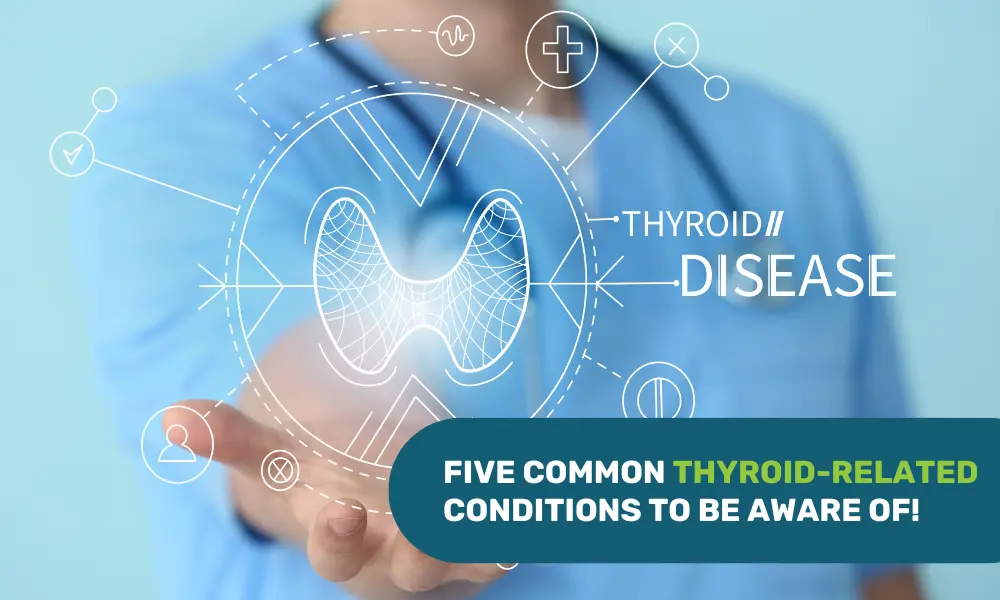Thyroid disorders are prevalent conditions that affect the thyroid gland, a small butterfly-shaped organ in our neck. The thyroid plays a vital role in regulating metabolism by producing hormones that influence various bodily functions. Common thyroid disorders include hypothyroidism, hyperthyroidism, and thyroid nodules.
Thyroid Disorders & Their Symptoms
-
Hyperthyroidism is when the thyroid gland produces an excess of thyroid hormones. Symptoms of hyperthyroidism include increased appetite, weight loss, anxiety, sweating, rapid heartbeat, and irritability. Graves’ disease, an autoimmune disorder, is a leading cause of hyperthyroidism. It can also result in eye problems such as bulging eyes.
-
Hypothyroidism is another thyroid-related disorder that occurs when the thyroid gland does not produce enough thyroid hormones. Common symptoms include fatigue, weight gain, cold intolerance, dry skin, and constipation. Additionally, individuals with hypothyroidism may experience depression, muscle weakness, and menstrual irregularities in women.
-
Postpartum thyroiditis is another disorder, typically occurring in the first year after childbirth. It involves inflammation of the thyroid and can lead to temporary hyperthyroidism followed by hypothyroidism. Women may experience fatigue, mood swings, and weight changes.
-
Graves’ disease is another disorder related to the thyroid. It is an autoimmune disorder when our body’s immune system mistakenly attacks our thyroid gland. This can cause our gland to overproduce the hormone regulating our metabolism. Some of the symptoms include anxiety, irritability, fatigue, hand tremors, and increased or irregular heart rate.
-
Thyroid nodules are growths or lumps on the thyroid gland. While most nodules are non-cancerous, some can be cancerous. Many thyroid nodules are asymptomatic, but some may cause difficulty swallowing, neck pain, or a visible lump in the neck. Regular monitoring and, if necessary, biopsy is crucial for evaluating the nature of thyroid nodules. One must consult an Endocrinologist in case of any visible lump in the neck.
Iodine deficiency can contribute to thyroid disorders, particularly hypothyroidism. Iodine is important for producing thyroid hormone, and insufficient levels of iodine can cause goiter, an enlargement of the thyroid gland. While iodine deficiency is not common in regions with sufficient dietary iodine, it remains a concern in some parts of the world.
It is essential to note that these symptoms can vary in severity and may overlap between different thyroid disorders. Diagnosing and managing thyroid disorders often involve blood tests to measure thyroid hormone levels, imaging studies, and, if necessary, thyroid biopsy.
Here are some ways one can reduce the risk of developing thyroid disorder.
-
Maintaining a healthy body weight.
-
Having a diet low in sugar and processed food.
-
Limit intake of coniferous vegetables like cabbage and broccoli.
-
Stay physically active most time of the week.
-
Manage stress.
-
Regular monitoring of thyroid levels is important.
In a nutshell, thyroid disorders are diverse and can significantly impact our overall health. Recognizing the symptoms and seeking medical attention for proper diagnosis and treatment is essential for managing these conditions effectively.





